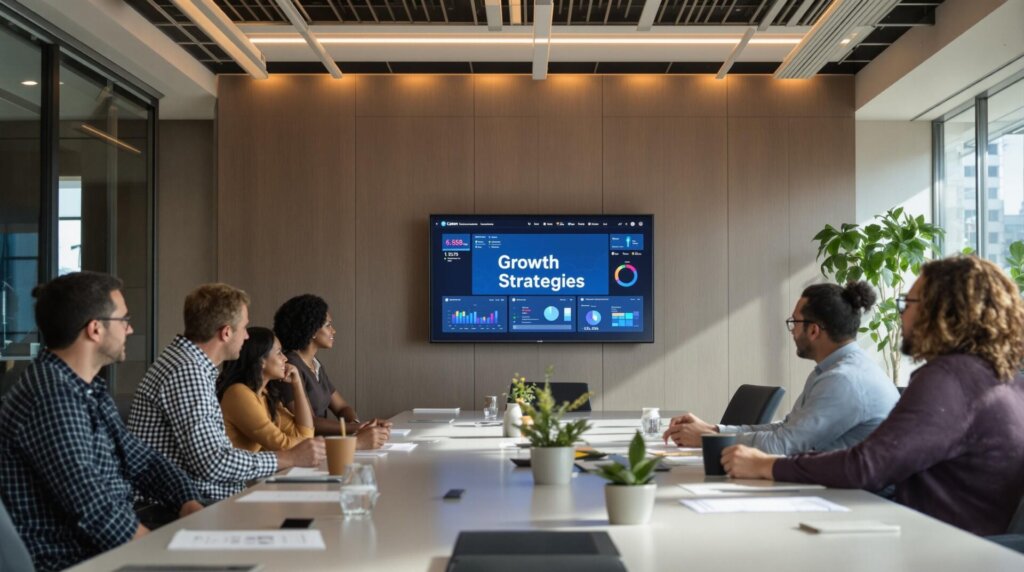Sustainable growth strategies are rapidly transforming how businesses think about success. More than 70 percent of leading companies now prioritise environmental and social responsibility alongside profits. This might sound like just another corporate tick box. Yet the real surprise is how these strategies help firms weather economic storms and come out stronger than their competitors.
Table of Contents
- What Are Sustainable Growth Strategies?
- The Importance Of Sustainable Growth In Today’s Economy
- Key Components Of Effective Sustainable Growth Strategies
- How Sustainable Growth Strategies Are Implemented In Business
- Real-World Examples Of Successful Sustainable Growth Strategies
Quick Summary
| Takeaway | Explanation |
|---|---|
| Sustainable growth enhances business resilience | Companies adopting sustainable practices show greater adaptability to market changes and risks. |
| Focus on ecological, economic, and social balance | Successful strategies require integrating environmental sustainability with financial health and social responsibility. |
| Continuous innovation is essential | Embracing innovation helps businesses adapt and improve their operational efficiency while addressing sustainability. |
| Engage stakeholders actively | Cultivating transparent communication and collaboration with stakeholders is crucial for successful sustainable growth. |
| Implement SMART sustainability goals | Businesses should set specific, measurable, achievable, relevant, and time-bound goals to track their sustainability progress effectively. |
What Are Sustainable Growth Strategies?
Sustainable growth strategies represent a comprehensive approach to business development that balances economic performance with long-term environmental and social responsibility. These strategies go beyond traditional profit-driven models, focusing on creating value that benefits the business, its stakeholders, and the broader ecosystem.
Below is a table outlining the core principles of sustainable growth strategies and their focus areas. This helps clarify how each principle contributes to a comprehensive approach for business success.
| Principle | Focus Area |
|---|---|
| Ecological Sustainability | Reducing environmental footprint and integrating green practices |
| Economic Viability | Maintaining financial health and profitability |
| Social Responsibility | Supporting community development and ethical business practices |

Core Principles of Sustainable Growth
Sustainable growth strategies centre on creating resilient business models that can adapt and thrive while minimizing negative environmental and social impacts. According to research from the OECD, these strategies typically involve three fundamental elements:
- Ecological Sustainability: Reducing environmental footprint and integrating green practices
- Economic Viability: Maintaining financial health and profitability
- Social Responsibility: Supporting community development and ethical business practices
Strategic Implementation Approaches
Businesses implement sustainable growth strategies through various methodological approaches. These might include investing in renewable technologies, developing circular economy models, or creating products with minimal environmental impact. Learn more about innovative business strategies that can help companies transition towards more sustainable operational frameworks.
Successful sustainable growth requires a holistic view that recognizes interconnections between business performance, environmental health, and social well-being. It demands strategic thinking that looks beyond quarterly financial reports and considers long-term global implications of business decisions.
Key characteristics of sustainable growth strategies include:
- Continuous innovation and adaptation
- Stakeholder engagement and transparent communication
- Commitment to measurable environmental and social objectives
- Integration of sustainability across all business functions
By adopting sustainable growth strategies, businesses can create more resilient, future-proof organisations that generate value not just for shareholders, but for society as a whole.
The Importance of Sustainable Growth in Today’s Economy
Sustainable growth has emerged as a critical strategic imperative for businesses navigating the complex economic landscape of the 21st century. As global challenges like climate change, resource scarcity, and social inequality intensify, companies must reimagine their approach to long-term success.
Economic Resilience and Competitive Advantage
According to research from Harvard Business School, businesses pursuing sustainable growth strategies demonstrate greater economic resilience. By integrating environmental and social considerations into their core business models, organisations can:
- Mitigate potential regulatory risks
- Attract forward-thinking investors
- Build stronger relationships with customers and stakeholders
- Create more adaptable and innovative organisational cultures
Transforming Business Performance
Sustainable growth is not just an ethical choice but a strategic business approach that drives tangible economic benefits. Companies that prioritise sustainability often experience improved operational efficiency, reduced waste, and enhanced brand reputation. Discover advanced business growth techniques that can help transform traditional business models into more sustainable frameworks.
Moreover, sustainable strategies enable businesses to anticipate and respond to emerging market trends. By understanding the interconnected nature of economic, environmental, and social systems, organisations can develop more robust and future-proof business models.
Key economic benefits of sustainable growth include:
This table provides an overview of the key economic benefits businesses can achieve by implementing sustainable growth strategies. It summarises the advantages as highlighted in the article, supporting a clearer understanding of their value.
| Economic Benefit | Brief Description |
|---|---|
| Lower operational costs | Achieved through improved resource efficiency |
| Enhanced brand value | Strengthens differentiation and reputation |
| Improved talent attraction | Engages current and potential employees |
| Greater long-term financial stability | Ensures steady growth and reduced risk |
- Lower operational costs through resource efficiency
- Enhanced brand value and market differentiation
- Improved talent attraction and employee engagement
- Greater long-term financial stability
In an era of unprecedented global challenges, sustainable growth represents more than a trend. It is a fundamental reimagining of business success that recognises the interdependence of economic prosperity, environmental stewardship, and social well-being.

Key Components of Effective Sustainable Growth Strategies
Developing robust sustainable growth strategies requires a multifaceted approach that integrates technological innovation, organisational culture, and strategic planning. Businesses must move beyond traditional growth models to create comprehensive frameworks that balance economic performance with environmental and social responsibility.
Strategic Innovation and Technological Integration
According to research from Seattle University, effective sustainable growth strategies encompass several critical technological and operational practices. Key focus areas include:
- Optimising energy consumption and resource utilisation
- Implementing advanced waste management systems
- Designing products with minimal environmental impact
- Leveraging digital technologies for sustainable solutions
Organisational Culture and Stakeholder Engagement
Successful sustainable growth strategies demand a holistic approach that extends beyond technical implementations. Explore innovative business growth techniques that emphasise creating a comprehensive sustainability ecosystem within organisations.
Building a sustainable business model requires active engagement and commitment from all levels of the organisation. This involves:
- Developing clear sustainability policies and objectives
- Fostering a culture of continuous learning and innovation
- Encouraging employee participation in sustainability initiatives
- Creating transparent communication channels with stakeholders
Organisations must recognise that sustainable growth is not a static destination but a dynamic, ongoing journey of adaptation and improvement. By integrating environmental consciousness, social responsibility, and economic viability, businesses can create resilient strategies that generate long-term value for all stakeholders.
How Sustainable Growth Strategies Are Implemented in Business
Implementing sustainable growth strategies requires a systematic and integrated approach that transforms organisational thinking and operational practices. Businesses must develop comprehensive frameworks that align economic objectives with environmental and social responsibilities.
Strategic Integration and Governance
According to research from the Brookings Institution, successful implementation involves three critical integration mechanisms:
- Strategic integration of sustainability into core business objectives
- Operational integration across different business functions
- Organizational integration involving leadership commitment and cultural transformation
Practical Implementation Frameworks
Businesses can translate sustainable growth strategies into actionable plans by establishing clear mechanisms for measurement, accountability, and continuous improvement. Discover advanced implementation techniques that help organisations create robust sustainability frameworks.
Effective implementation requires developing specific, measurable, achievable, relevant, and time-bound (SMART) sustainability goals. These goals should address key areas such as:
- Carbon emissions reduction
- Resource efficiency
- Social impact measurement
- Ethical supply chain management
Successful sustainable growth implementation is not a one-time project but a continuous journey of organisational learning, adaptation, and innovation. Companies must remain flexible, regularly reassess their strategies, and be willing to evolve their approaches in response to changing environmental and social landscapes.
Real-World Examples of Successful Sustainable Growth Strategies
Real-world examples demonstrate how organisations across diverse industries have successfully integrated sustainable growth strategies into their core business models. These practical case studies highlight the tangible benefits of adopting comprehensive, forward-thinking approaches to business development.
Technology and Innovation Sector
Leading technology companies have pioneered sustainable growth strategies by reimagining product development and operational practices. Companies like Patagonia have set industry benchmarks by:
- Implementing circular economy principles in product design
- Creating transparent supply chain reporting
- Investing in regenerative environmental programmes
- Prioritising employee well-being and social responsibility
Manufacturing and Industrial Transformation
Manufacturing organisations are increasingly recognising the strategic importance of sustainable practices. Explore successful business transformation techniques that demonstrate how companies can integrate sustainability into their core operations.
Companies like Interface, a global carpet manufacturer, have transformed their business model by:
- Developing carbon-negative manufacturing processes
- Creating closed-loop product recycling systems
- Investing in renewable energy infrastructure
- Establishing ambitious long-term sustainability targets
These examples illustrate that sustainable growth is not a constraint but an opportunity for innovation, efficiency, and competitive differentiation. By viewing sustainability as a strategic advantage, businesses can unlock new markets, attract conscious consumers, and build resilient, future-proof organisations.
Ready to Make Sustainable Growth a Reality for Your Business?
Many business owners today struggle to bridge the gap between understanding sustainable growth strategies and taking clear, practical action. If you are looking to adapt your business model, strengthen your resilience and meet your environmental and social goals, the journey can feel overwhelming. You need tools, trusted guidance and the right digital infrastructure to achieve meaningful and measurable results in efficiency, brand value and innovation. Explore more insights on our resources page to see how Smart Business 100 supports your journey from theory to tangible success.

Do not let uncertainty hold your business back in a rapidly changing world. Benefit from expert solutions in digital marketing, web development and operational optimisation. Join the community at Smart Business 100 today and gain access to the strategies and premium tools that drive confident, lasting business growth. Start transforming your business vision into real outcomes right now.
Frequently Asked Questions
What are sustainable growth strategies?
Sustainable growth strategies are comprehensive approaches to business development that balance economic performance with long-term environmental and social responsibility, aiming to create value for businesses and their stakeholders while minimising negative impacts.
Why are sustainable growth strategies important for businesses?
They are crucial because they help businesses navigate global challenges like climate change and resource scarcity, providing competitive advantages, enhancing brand reputation, and ensuring long-term economic resilience.
What are the key components of effective sustainable growth strategies?
Key components include strategic innovation, organisational culture, stakeholder engagement, and the integration of sustainability into core business functions, with measurable objectives focused on ecological, economic, and social aspects.
How can businesses implement sustainable growth strategies?
Businesses can implement these strategies through systematic integration of sustainability into their core objectives, establishing measurable goals, and fostering a culture that supports continuous improvement and stakeholder engagement.


